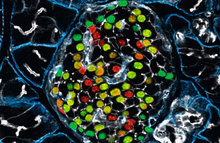Neuherberg, 25.10.2019
Helmholtz Zentrum München allies with Eli Lilly and Company to discover new targets for pancreatic beta cell regeneration in the treatment of diabetes
The Institute of Diabetes and Regeneration Research at Helmholtz Zentrum München and the global pharmaceutical company Eli Lilly and Company (Lilly) have entered a new strategic research collaboration in the field of pancreatic beta cell regeneration. The joint goal is to improve and accelerate treatment of diabetes mellitus.
Diabetes mellitus is a complex and multifactorial disease characterized by progressive loss or dysfunction of the insulin-producing beta cells in the pancreas. Its long-term complications and co-morbidities represent one of the most devastating and urgent threats to our society. While significant progress has been made in diabetes management, none of today’s therapies are able to stop or reverse disease progression. Therefore, the development of novel therapeutic approaches that modify the course of disease represents an urgent need for diabetes research.
This new collaboration between Helmholtz Zentrum München and Lilly will focus on the identification, validation and targeting of novel pathways and molecules for triggering endogenous beta cell regeneration. The long-term goal is to develop new therapies that preserve and/or restore mass and functionality of patient’s remaining beta cells during diabetes progression.
Prof. Heiko Lickert, Director of the Institute of Diabetes and Regeneration Research, said: “We are excited to be working with Lilly. This collaboration is a perfect opportunity to combine the strength of our basic and translational research performed at Helmholtz Zentrum München with Lilly’s expertise in drug discovery and development for diabetes therapy.”
Ruth Gimeno, Ph.D., Vice President, diabetes research and clinical investigations at Lilly, stated: “Slowing diabetes progression and reversing the course of disease is an important goal of diabetes research at Lilly. We are excited to be working with Helmholtz Zentrum München to identify pathways and targets that have the potential to translate into novel disease-modifying therapies for people living with diabetes.”
The research activities of the Institute of Diabetes and Regeneration Research (IDR) focus on the biological and physiological study of the pancreas and/or the insulin producing beta cells. Thus, the IDR contributes to the elucidation of the development of diabetes and the discovery of new risk genes of the disease. Experts from the fields of stem cell research and metabolic diseases work together on solutions for regenerative therapy approaches of diabetes. The IDR is part of the Helmholtz Diabetes Center (HDC).
As German Research Center for Environmental Health, Helmholtz Zentrum München pursues the goal of developing personalized medical approaches for the prevention and therapy of major common diseases such as diabetes mellitus, allergies and lung diseases. To achieve this, it investigates the interaction of genetics, environmental factors and lifestyle. The Helmholtz Zentrum München has about 2,500 staff members and is headquartered in Neuherberg in the north of Munich. Helmholtz Zentrum München is a member of the Helmholtz Association, a community of 19 scientific-technical and medical-biological research centers with a total of about 37,000 staff members.
Press contact

Birgit Niesing
niesing(at)dzd-ev.de
+49 (0)89 3187-3971

